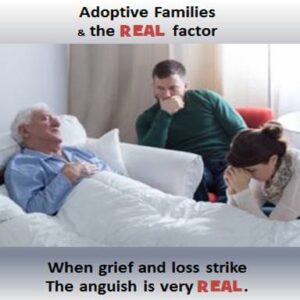
As we discussed in a recent blog, adoptive families are often questioned in one way or another about who the “REAL” relationship figures are in their lives. These questions land like a sucker punch to the chest. Sometimes we can quickly recenter ourselves and decide how we want to respond. At other times, their verbal assault knocks us off balance and leaves us reeling. Let me offer you a personal insight.
Here are some examples:
- Do you know who your real parents are?
- Do You have any real siblings?
- Do you have any real children?
Pause to consider these questions and imagine you were an adopted child answering them. Which of their parents should they label as un-real or inauthentic? If you imagine that you are both an adoptive parent and the parent of children born to you, which of these children would you label as un-real or inauthentic? If you are a person that has siblings both by birth or adoption, which of them would you label as un-real or inauthentic? How does it feel to categorize your family members along these dividing lines?
Clearly some of this catch-22 can be avoided if clarifying language were used. For example, which children were born to you and which did you adopt? Nonetheless, the question almost always stirs up a lot of emotional baggage. And, by its very presence, questions the authenticity of these relationships and the bonds that unite them. They are real even if they differ from the norm.
As I’ve mentioned several times during the last year, my husband is in the end stages of a terminal disease and I am caring for him at home. My children have been stalwart throughout this process. Their bond with their dad is very REAL. They visit regularly and make an earnest effort to cheer their dad on and to enjoy time with him while they are able. They perform many kindnesses, bring him his favorite food treats and spend time with him. When I need help, they respond promptly and gladly. This makes me proud and appreciative. We are so lucky that they live nearby and are able/willing to help.
Terminal illness is a challenge for any family but the long slow, decline of a degenerative neurological disease is especially heartbreaking. The physical and cognitive losses are so difficult to watch. Seeing their robust and intelligent father decline so precipitously grieves me and my children in a viscerally painful way. I assure you their emotions and their attachments are very genuine. They love their dad and speak of how he parented and loved them well–humanly, imperfectly, deeply–and in a way they experienced as very REAL. Their best–and most REAL–expression of their bond with their dad is their actions.
Since the 1980’s when they were placed with us as infants, we’ve made a conscious and consistent effort to speak about their birth parents positively. We followed through on our promise to help them reconnect with their birth parents. (Years ago, they both took us up on our promise.) We consistently reassure them that we are NOT in competition with their birth families, that we consider their birth family relationships a vital and important part of their lives and, therefore, an integral and valued part of ours.
As their parent, I am concerned for their emotional well being as we face this next chapter in our lives. How will they handle their anguish? Will it tear away the scab from the pain of their adoption-connected losses? Exacerbate their pain? How can I best support them?
For adoptive families who have not embraced openness in adoption and who are facing an adoptive parent’s death, children may experience an ambivalent, unsettling sense of profound grief and simultaneously feel that they now finally have the freedom to search out their biological family connections. That pairing of grief, guilt and relief make a painful emotional soup.
I encourage families to commit to seeing both adoptive and birth families as REAL and important relationships in their children’s lives. Make absolutely sure your kids know your adoption-attuned position. Reiterate your stance until you are certain they believe your inclusivity is genuine. Do not ask your children to choose between one or the other. Adoptees need all of their “parts.” We must not expect them to choose between us. That kind of monolithic loyalty oath is too high a price to pay for a loving family.
As Lori Holden asserts in her landmark book, The Open-hearted Way to Open Adoption: Helping Your Child Grow Up Whole openness does not directly equate with visitation; it is first and foremost an attitude of the heart. (Lori’s book is essential reading for adoptive families and we have previously reviewed it.) Even if your adoption is not fully open, the underlying respect and value that you hold for your children’s birth family is a foundational pillar of your attachment. To explore this concept further, read Lori’s book.
In conclusion, adoptive families and their bonds are authentic, REAL and significant. Don’t let anyone imply otherwise.
http://wp.me/p4r2GC-1AU
Listen to our podcasts: Adoption Matters: Real People. Real Life. Real Talk and Essentials of Adoption Attuned Parenting
Read Books written by our coaches
Click to learn more about Adoption Attuned Certified coaching!



This post beautifully shares the deep love and bond that adoptive families can share just as birth families do. I agree that illness and death can bring out feelings of ambivalence. And this I find true throughout our children’s lives as they move through life cycle events. The ambivalence can arise simply because there isn’t the opportunity for reunion and continued connection with the birth family. You and your children are fortunate to have that opportunity. And I applaud your willingness to embrace it! What a great gift for all of you. #adoption #adoptivefamilies #AAQ